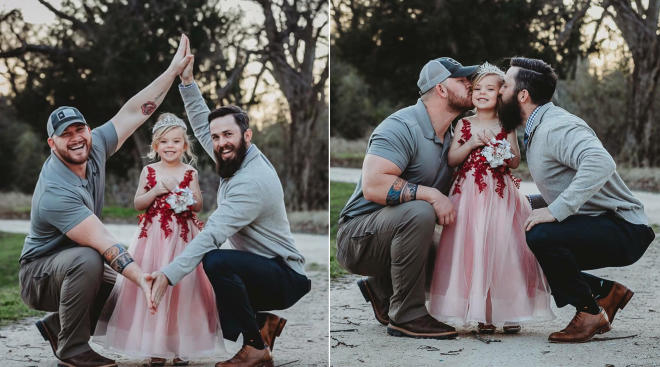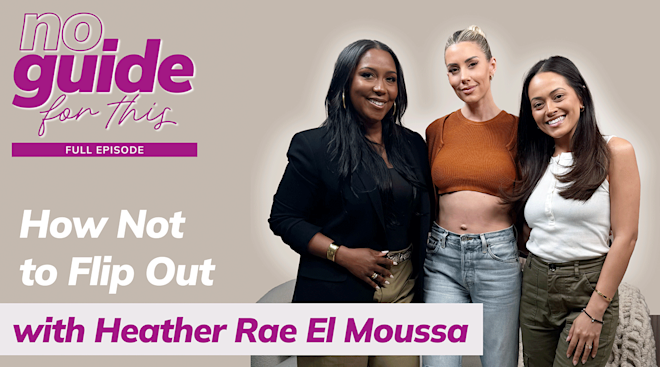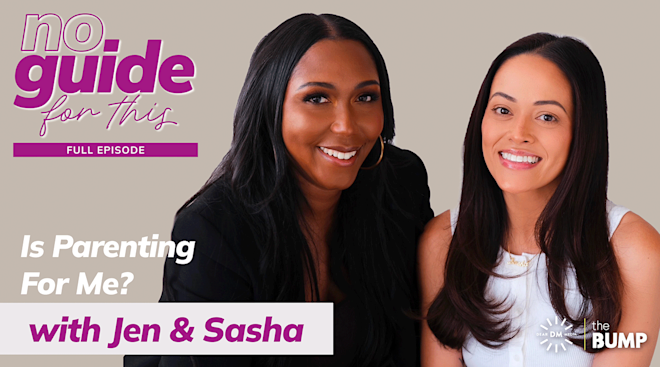A Family Lawyer’s Tips for LGBTQ+ Couples Considering Divorce With Kids
Divorce is difficult and complex for any family, but for LGBTQ+ couples, there can be additional legal challenges to navigate. Federal law currently recognizes and protects same-sex marriage, and, with it, the right to divorce. But local laws vary, and many states may have additional requirements or considerations. So where does that leave LGBTQ+ couples contemplating divorce? The Bump partnered with Ashley M. Silberfeld, Esq., a partner in the matrimonial and family law practice at Blank Rome LLP to get you answers to your most important questions. “As I tell my clients, it’s important to have eyes open to some of the potential landmines, since this can make a crucial difference in the outcome of a potential divorce. The goal is to keep the process as free from surprises as possible,” Silberfeld says. Below, she shares the key things you need to know:
LGBTQ+ couples have the same custodial rights as any other couple, so long as both parents have the same legal parental rights, like in the case of adoption. With jointly adoptive parents, the child custody terrain looks the same as it would in a heterosexual divorce. The same is true for couples who have gone through the legal process of surrogacy to have a child. But what about those families who have one biological parent and one non-biological parent? This is a perfect example of a gray area. The reality is that the courts just haven’t caught up to the experiences of today’s families.
In a heterosexual marriage, the husband is presumed to be the parent of the children regardless of whether he actually fathered them. But this notion of “presumed parenthood” doesn’t always apply to non-biological parents in same-sex or LGBTQ+ marriages. As a result, the non-biological parent may have fewer parental rights, and judges may end up favoring the biological parent in a custody arrangement. So how can you make sure you’re protected as a non-biological parent in a divorce?
Ultimately, the simplest custodial disputes are ones where both partners are legal parents. Before addressing any custody issues, a couple should first make sure they’ve established parental rights and are both recognized as the child’s legal parents. (Ideally, this should happen right away, before there are any marital issues.) There are several ways to do this, including through court order, by signing an official declaration of parentage or by officially adopting the child. These are some of the measures that’ll ensure that both parents will be recognized as the child’s parent in the eyes of the law.
In California—where I practice—family courts examine the particular facts and circumstances of each case to determine if a non-biological parent has parental rights and obligations. In one case involving a lesbian couple who never registered as domestic partners, got married or completed adoption proceedings, the court found that both parties were the children’s legal parents because, among other things, each party was a biological mom and gave birth to at least one of their three children; all of the children had both parents’ hyphenated last name; both parents breastfed all of the children and both parties held out all of the children as their own to the public. Other states may not be as liberal. So, without a doubt, my biggest piece of advice is to first make sure to establish those parental rights, and to learn about the child custody laws in your state.
States across the country generally agree that parents must share the financial responsibility for raising their children. Usually, child support is paid to the parent who takes on primary caretaking duties (i.e. the parent with sole or majority custody) to contribute to the child’s living expenses. In cases where parents share 50-50 custody of their children, child support is still an issue because one party frequently earns more than the other. The amount of these monthly child support payments is determined by several factors; the most significant of these include each parent’s income and earning capacity and the amount of time each spends with the child. In other words, custody and child support go hand in hand. If a non-biological parent hasn’t been legally established to be a parent, they may have no child support responsibility, resulting in the full financial responsibility of raising the child falling to the biological parent. To that end, making sure that both parents have established parental rights is crucial—not only for pre-empting custody issues but to head off any issues around child support too.
For couples who entered a civil union or domestic partnership before marriage was an option, divorce can be a little more complicated—depending on where you live and how marriage equality laws evolved in your state. Some local laws (such as those in New York City) provide that a registered domestic partnership automatically terminates when a couple gets married. In Orlando, a registered domestic partnership automatically terminates if just one of the parties gets married (even if to someone other than their registered domestic partner). But not all cities, counties and states terminate previous statuses when a marriage takes place, which can result in someone having multiple relationship statuses. Needless to say, having a prior relationship status intact can complicate a dissolution of marriage in several ways, including the ability to re-marry later.
Working with an attorney familiar with your specific state laws is key on this front and others. California happens to be one of the states that’ll allow you to get a divorce and terminate a domestic partnership in the same legal proceeding.
Same-sex and LGBTQ+ couples are entitled to spousal support (alimony) just like any couple, but in practice, this can be a bit more complex. An obstacle that same-sex couples may face is the way some courts determine when a marriage began. The length of the marriage is an important factor in divorce cases, as it can affect how assets should be divided (i.e., what is/isn’t a community or marital asset) and what spousal support should be.
Depending on the state, a couple may have only been able to legally marry recently. So what if a same-sex couple cohabitated for a decade or two prior to marrying? What if two people in a same sex or LGBTQ+ couple were registered domestic partners for decades, and only were able to get married in the last three to five years? In other words, what do you do if your pre-marriage relationship has been longer than your marriage? Unlike heterosexual couples who’ve always simply been able to determine the date of their legal union, many same-sex couples had to wait years for permission from the state or federal government to marry—even if they lived like married couples with all that entails (children, property, etc.) long before any official ceremony occurred.
How states handle this issue varies. In California, the general rule is that the pre-marriage portion of a relationship will not be included in defining the length of the marriage for spousal support purposes. However, if you were registered domestic partners before getting married, the period of the domestic partnership would be considered in determining the length of the marriage for spousal support purposes.
To me, mediation or other forms of informal resolution are always the preferred ways to settle family law matters rather than proceeding to litigation and handing your personal affairs to a judge. The benefits of meditation include:
- Reduced contentiousness and increased long-term cooperation
- More privacy protection (a court divorce can reveal sensitive financial and personal information and even create security risks down the line)
- A streamlined custody process (mediation can shield children from court appearances and questioning)
- Money saved on attorneys
- A quicker resolution, as the backlog in courts these days protracts the legal process
Mediation may be especially wise, as judges may not fully comprehend the subtle differences LGBTQ+ people face, particularly when it comes to child custody and parenting. Mediation has the potential to arrive at a result suitable to both parties—one where gender identity doesn’t play a role in determining the outcome, and where some of the nuances mentioned above can be recognized.
Clearly, in the legal realm, LGBTQ+ rights still have a long way to go. My sincere hope is that this will evolve in years to come, so that family law will be a sphere where LGBTQ+ people have the same rights as anyone else, in any jurisdiction. Divorce is tough enough as is.
About the author:
Ashley M. Silberfeld, Esq., is a partner in the matrimonial and family law practice at Blank Rome LLP. She has spent most of her 20-plus-year career as an attorney handling and resolving all aspects of family law matters, including litigating high-conflict custody, complicated property and support issues, as well as resolving cases through mediation and alternative dispute resolution. Ashley is particularly well-versed in the women’s health and reproductive rights space and advises clients on legal issues around same-sex marriage and surrogacy, among other topics. She lives in Los Angeles with her children.
Please note: The Bump and the materials and information it contains are not intended to, and do not constitute, legal advice and should not be used as such. You should always consult with your legal advisors about your specific circumstances. This information contained herein is not necessarily exhaustive, complete, accurate or up to date and we undertake no responsibility to update. In addition, we do not take responsibility for information contained in any external links, over which we have no control.
Ashley M. Silberfeld, Esq., is a partner in the matrimonial and family law practice at Blank Rome LLP. She has spent most of her 20-plus-year career as an attorney handling and resolving all aspects of family law matters, including litigating high-conflict custody, complicated property and support issues, as well as resolving cases through mediation and alternative dispute resolution. Ashley is particularly well-versed in the women’s health and reproductive rights space and advises clients on legal issues around same-sex marriage and surrogacy, among other topics. She lives in Los Angeles with her children.
Learn how we ensure the accuracy of our content through our editorial and medical review process.
Navigate forward to interact with the calendar and select a date. Press the question mark key to get the keyboard shortcuts for changing dates.




















































